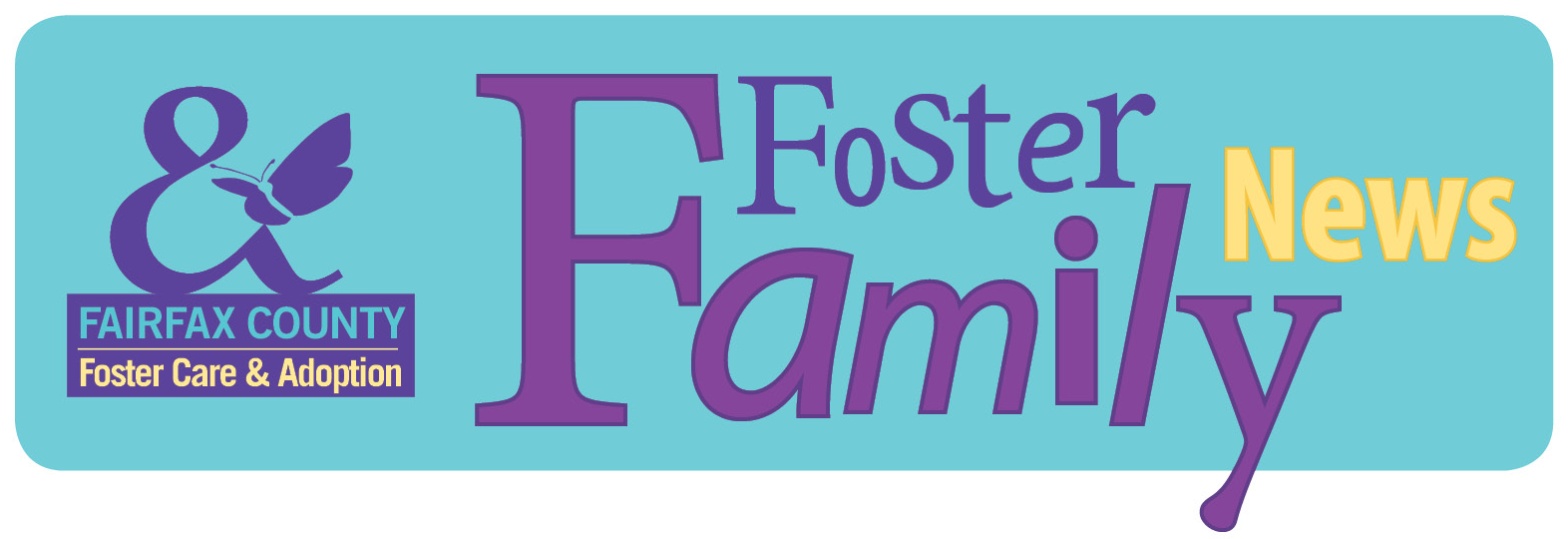
Welcome to the 2021 September issue of Foster Family News, a monthly newsletter for current and potential Fairfax County foster parents.
| Table of Contents | |
|---|---|
|
|
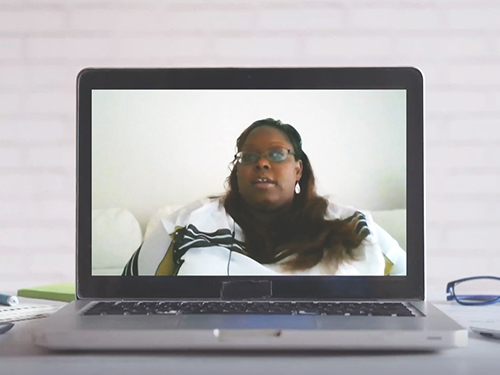 Learn from foster parent, Aisha Bigbee, about developing partnerships with biological parents, forming lasting bonds with children in her care, and the joy she feels when families reunite, and kids thrive! Today, nearly 200 Fairfax County children are in foster care. The Department of Family Services' Foster Care and Adoption Program offers temporary foster homes for these children, and services to help their families. Check out the video.
Learn from foster parent, Aisha Bigbee, about developing partnerships with biological parents, forming lasting bonds with children in her care, and the joy she feels when families reunite, and kids thrive! Today, nearly 200 Fairfax County children are in foster care. The Department of Family Services' Foster Care and Adoption Program offers temporary foster homes for these children, and services to help their families. Check out the video.
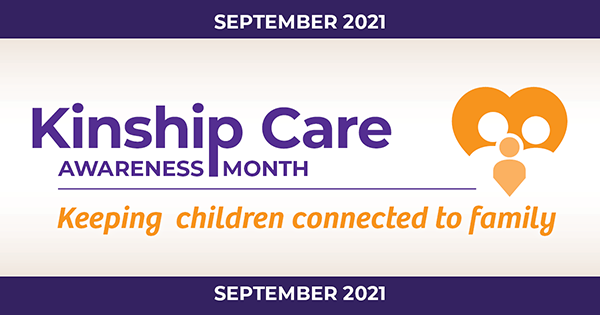 The Fairfax County Board of Supervisors has proclaimed September as Kinship Care Awareness Month, a time to acknowledge and celebrate the importance of kinship caregivers and the children they are raising in stable, loving and nurturing households when parents are unable to do so due to challenging family situations. Fairfax County is committed to prioritizing a kin-first culture and supporting kinship families who are raising a relative’s or close family friend’s child on their own or with child welfare support. Learn about the services and supports the county provides to kinship families.
The Fairfax County Board of Supervisors has proclaimed September as Kinship Care Awareness Month, a time to acknowledge and celebrate the importance of kinship caregivers and the children they are raising in stable, loving and nurturing households when parents are unable to do so due to challenging family situations. Fairfax County is committed to prioritizing a kin-first culture and supporting kinship families who are raising a relative’s or close family friend’s child on their own or with child welfare support. Learn about the services and supports the county provides to kinship families.
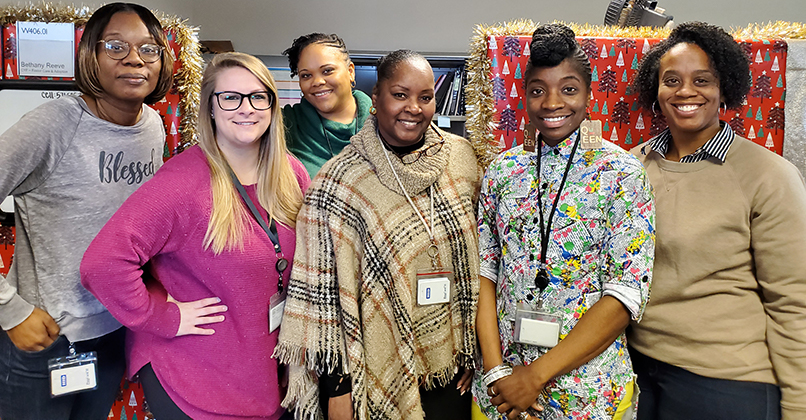 Check out this story of how staff supported a young lady who had moved to Virginia to live with her father during her mother’s illness. After entering foster care for her safety, the youth and her mother began the long work to repair their relationship while her mother worked on her own health. They were able to establish appropriate roles and responsibilities and eventually be reunified as mother and daughter.
Check out this story of how staff supported a young lady who had moved to Virginia to live with her father during her mother’s illness. After entering foster care for her safety, the youth and her mother began the long work to repair their relationship while her mother worked on her own health. They were able to establish appropriate roles and responsibilities and eventually be reunified as mother and daughter.
 Implementation of The Family First Prevention Services Act (FFPSA) began July 1, 2021. Its focus is twofold – reducing the number of children in foster care through prevention services that support safe, stable families; and making sure that children who are separated from their parents and enter foster care are placed in family-like settings (foster care, kinship care) receiving evidence-based, trauma-informed services to support their resilience. Find out more about what this means for the way we do foster care in Fairfax County.
Implementation of The Family First Prevention Services Act (FFPSA) began July 1, 2021. Its focus is twofold – reducing the number of children in foster care through prevention services that support safe, stable families; and making sure that children who are separated from their parents and enter foster care are placed in family-like settings (foster care, kinship care) receiving evidence-based, trauma-informed services to support their resilience. Find out more about what this means for the way we do foster care in Fairfax County.
 Nationally, only about 50% of children in foster care graduate from high school, and the number of college graduates is significantly lower. So, each year we recognize the accomplishments of youth graduates including high school, college, vocational certificate programs, or GED recipients. For the second year in a row due to COVID concerns, Foster Care and Adoption has been unable to host its usual in-person celebration, but that did not stop the celebration. Find out more about the special event.
Nationally, only about 50% of children in foster care graduate from high school, and the number of college graduates is significantly lower. So, each year we recognize the accomplishments of youth graduates including high school, college, vocational certificate programs, or GED recipients. For the second year in a row due to COVID concerns, Foster Care and Adoption has been unable to host its usual in-person celebration, but that did not stop the celebration. Find out more about the special event.
 Under normal circumstances, children can experience a mixture of emotions about the return to school in the fall. Given all the COVID-related changes that children have experienced in the last year, their feelings are more complicated than ever.
Under normal circumstances, children can experience a mixture of emotions about the return to school in the fall. Given all the COVID-related changes that children have experienced in the last year, their feelings are more complicated than ever.
Now is a good time for to start having conversations with children to help them have a positive outlook on going back to school. Check out these tips offered by staff in our Neighborhood Networks program.
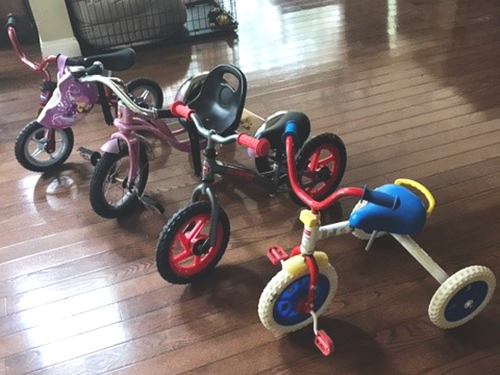 The Foster Closet has helped many families get a head start on providing kids with all they need to adjust in their new homes.
The Foster Closet has helped many families get a head start on providing kids with all they need to adjust in their new homes.
Many children come into care, sometimes late at night, with only the clothes on their backs. Within hours, the closet can get these families a few of the necessities to make that transition smoother.
Learn more about the Foster Closet.
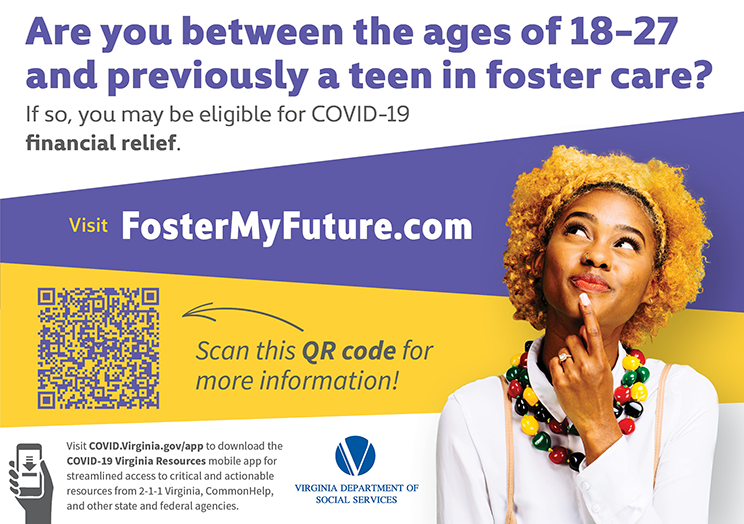 VDSS, through their Fostering Futures program, has COVID relief funds available to eligible youth for a one-time payment of up to $1,500. If you are youth between the ages of 18-27 who was previously a teen in foster care, and you are in need a of some support, you may be eligible!
VDSS, through their Fostering Futures program, has COVID relief funds available to eligible youth for a one-time payment of up to $1,500. If you are youth between the ages of 18-27 who was previously a teen in foster care, and you are in need a of some support, you may be eligible!
You can also access the application online and you can contact your current or former LDSS for more details about and assistance in this process. If you are connected to a youth who qualifies, please share this message.
 Northern Virginia Parent Peer Support Group hosted by Northern Post Adoption Consortium, and Formed Families Forward.
Northern Virginia Parent Peer Support Group hosted by Northern Post Adoption Consortium, and Formed Families Forward.
Virtual Groups Meet via Zoom
First Sunday of every month.
Sept. 5, Oct. 3, Nov. 7, Dec. 5
7:30-9 p.m.
In-Person Groups Meet in Fairfax City
Third Wednesday of every month.
Sept. 15, Oct. 20, Nov. 17 and Dec. 15
7-8:30 p.m.
This free ongoing parent support group is led by trained peer leaders with personal and professional experience for families residing in Northern Virginia. Participants will experience a safe space for foster and adoptive parents and kinship caregivers to share experiences, concerns, frustrations and resources. Register online.
Virtual Kinship Cafés hosted by the Department of Family Services’ Parenting Education Programs
Virtual Groups Meet via Zoom
Wednesday, Sept. 8, Thursdays, Sept. 16, and 30
Wednesday, Oct. 6, Thursdays, Oct. 14, and 28
Kinship caregivers can talk with others who understand how difficult and joyful it can be raising a child for a family member or friend. Join us to discuss topics such as discipline, self-care, and family rules. You can also find out about community resources that you may not have known existed. Sign up for a Kinship Café by sending an email or calling 703-324-7720 at least one business day before the Kinship Café. We look forward to you joining us!
The county is offering some in-person events at county facilities. In addition, our partners at Fairfax County Neighborhood and Community Services, Fairfax County Public Library, and the Fairfax County Park Authority continue providing exploration and fun through online resources.
Fairfax County Park Authority offers programs and classes for all ages. All classes are conducted according to Health Department and Centers for Disease Control and Prevention safety guidelines. Outdoor, indoor and virtual class options are available in a wide range of interest areas. You can get details about dates, times, and fees or register for programs at Parktakes online.
Fairfax County Public Library (FCPL)
FCPL offers robust virtual programming for all ages, which can be found on the FCPL online calendar, YouTube and Facebook. Learn about the top 10 ways to access FCPL resources at home. Get more information.
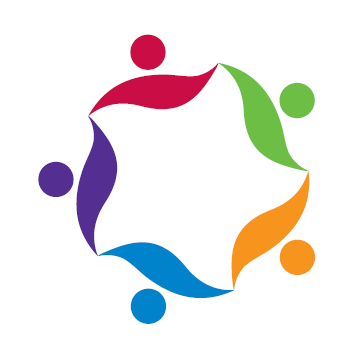 The Department of Family Services supports families and county residents of all ages and stages of life – and that definitely includes foster parents and families! Like and Follow @FairfaxCountyFamilyServices for news, events, tips, stories, training opportunities and more.
The Department of Family Services supports families and county residents of all ages and stages of life – and that definitely includes foster parents and families! Like and Follow @FairfaxCountyFamilyServices for news, events, tips, stories, training opportunities and more.
Each newsletter will include this section to help answer questions, spotlight the people who support foster families, highlight the donors and sponsors who generously give to foster care programs and activities and friendly reminders for foster families to sign-up for trainings.
 Question: When do we engage relatives in the foster care process?
Question: When do we engage relatives in the foster care process?




 What do you want to see in Foster Family News?
What do you want to see in Foster Family News?